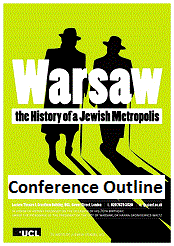Most studies of emerging Jewish urban centers in Eastern and Western Europe describe a unidirectional process of acculturation and upward mobility, and a concomitant shedding of traditional norms and practices. While this assessment seems appropriate in cases like St. Petersberg and Odessa, the case of Warsaw suggests a more complex model. Here, several ideologically opposed Jewish subcultures—Germanised and Polonised groups, normative rabbinic or Hasidic communities, a Russian-Jewish intelligentsia, and eventually political and artistic movements—emerged over the course of the nineteenth century and became equally entrenched.
The typical centralising agents of culture (e.g., schools, media, elite literature) were themselves decentralised, while economic success did not appear to favor one cultural group over another. At the same time, restrictions on Jewish residence and external pressures like anti-Semitism ensured enduring links between these sub-groups. In this profound cultural diversity, Jewish Warsaw resembled a modern urban enclave to a much greater extent than the familiar St.Petersberg-Odessa model.
The organisers of this academic event hope to encourage new visions of Warsaw, which was one of the most dynamic metropoles in modern Jewish history. Although compact Jewish settlement only commenced in the late 18th century, what emerged was one of the largest and most diverse Jewish settlements in the world on the cusp of the East-West divide. Residing in a nerve center of the region’s industrial revolution, all of Warsaw’s Jewish subgroups experienced the effects of modernisation.
But they reacted to modernisation in very different ways. It is the assumption of the organisers of this conference that the diversity of Jewish settlement in Warsaw and the emergence of massive sub-communities of diverse outlook, visions, and language over the long 19th century determined this metropole’s specific character. The Polish capital became a space of mutual perception among diverse Jewish communities, which shifted in their own composition, relationship and substance and led to an encounter unique in modern Jewish history.
That this diversity has not been sufficiently appreciated in historical writing can be attributed to a number of reasons. First and foremost, the destruction of Warsaw during World War II meant that together with her inhabitants, Warsaw lost substantial parts of its material tradition, its architectural substance, libraries, archives, private holdings. Furthermore, under communist rule, the interpretation of history became a highly sensitive activity. The great majority of Jewish survivors or repatriants chose to emigrate to the United States, Western Europe, and Israel. Finally, the almost total annihilation of Warsaw Jewry made the continuation of a local Jewish historiography an almost impossible task.
The complexities of Jewish life in Warsaw have, in consequence, tended to be reduced to questions of Polish-Jewish relations, antisemitism, and acculturation. Crucial events and phenomena in the history of Warsaw Jewry have been sidelined or ignored, such as the immigration of German Jews at the end of the 18th century, the international networks of Warsaw Jewish merchants, the cooperation of competing religious groups like Hasidim and Mitnaggdim in areas like philanthropy, the tremendous impact of Russian-Jewish immigration as early as the 1850s (and its acceleration after the expulsion of Moscow Jews in 1891) and the emergence of mass political movements in the city during the late 19th century.
The conveners believe that the potent combination of a highly dynamic economic sector, divergent religious communities, and a radicalised political intelligentsia, as well as a dynamic Polish patriotic movement, fomented not only political and social change but a specific form of Jewish self-awareness as well. An important manifestation of this self-awareness was a unique concentration of Jewish authors, publishers, editors, and an engaged Jewish reading public avidly following and discussing social, political, religious, and literary developments. These local publications reflect a vibrant spectrum of responses to modernity.
The conveners of the conference and the Institute of Jewish Studies at University College London are proud to organise this major academic event in honour of our teacher, colleague and friend, Professor Antony Polonsky, on the occasion of his 70th birthday.
Glenn Dynner, François Guesnet
